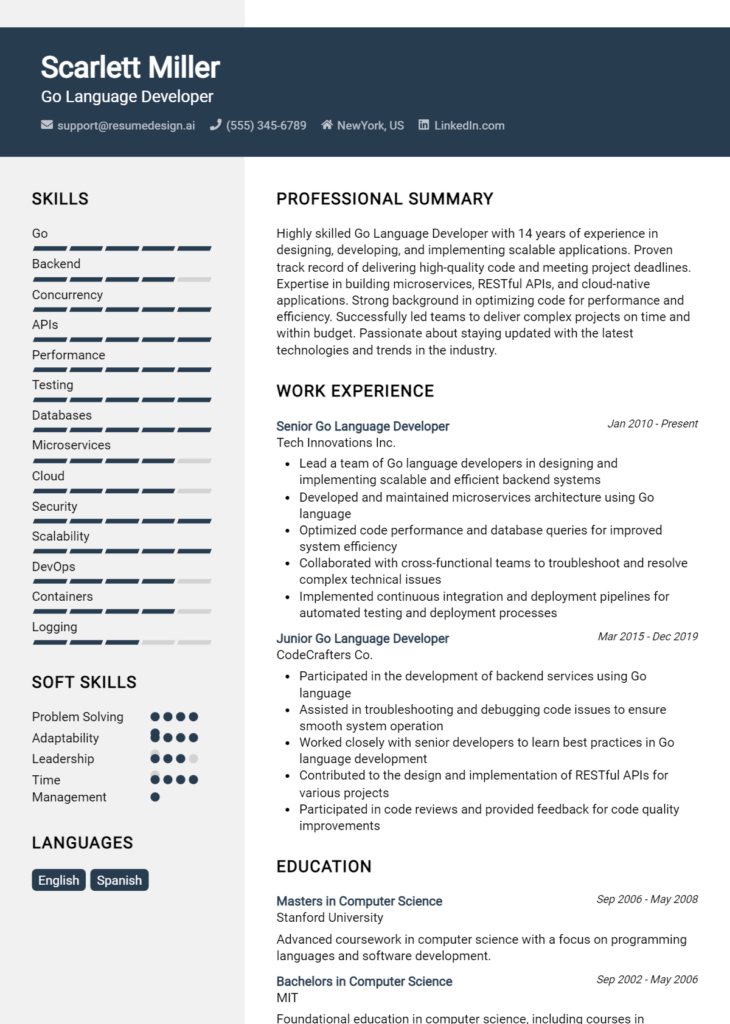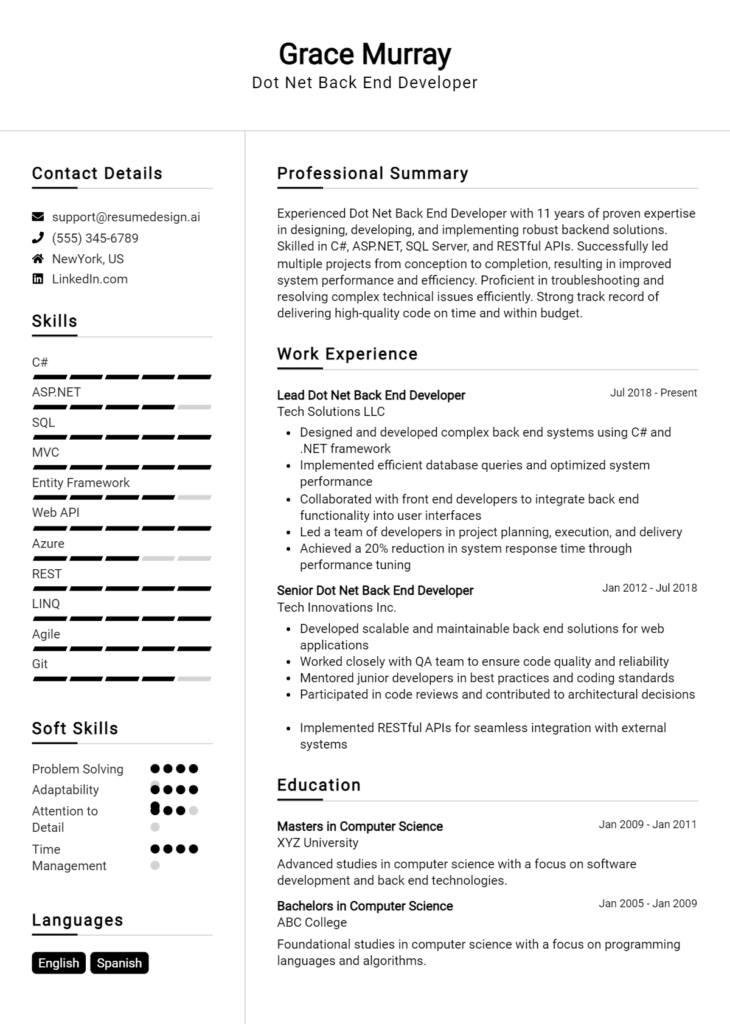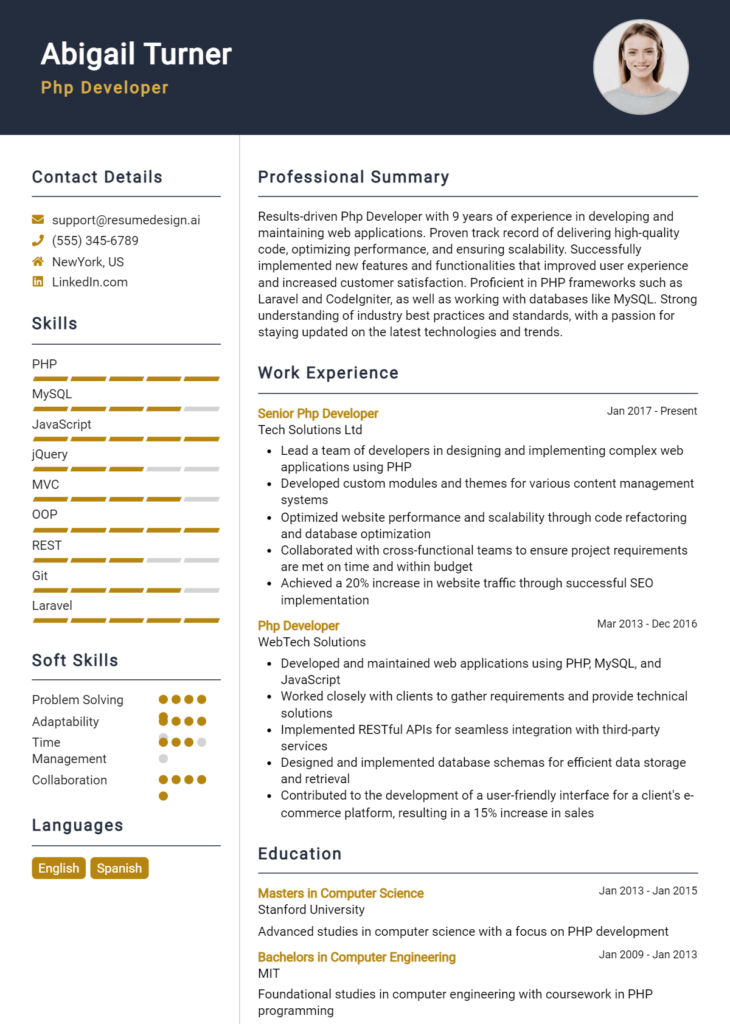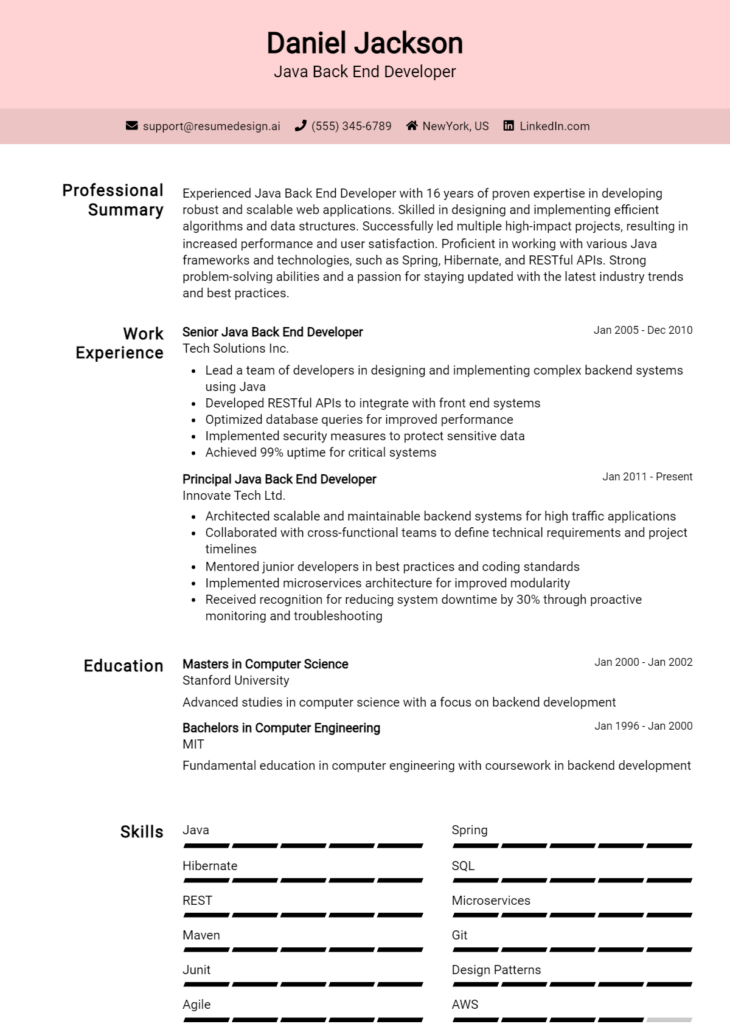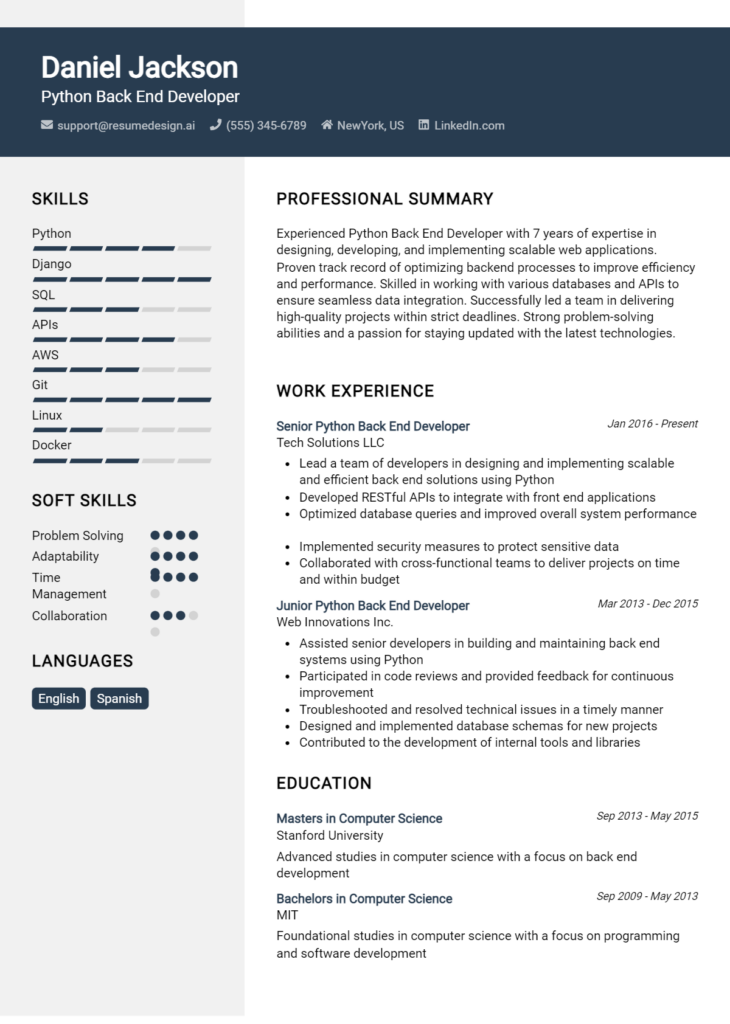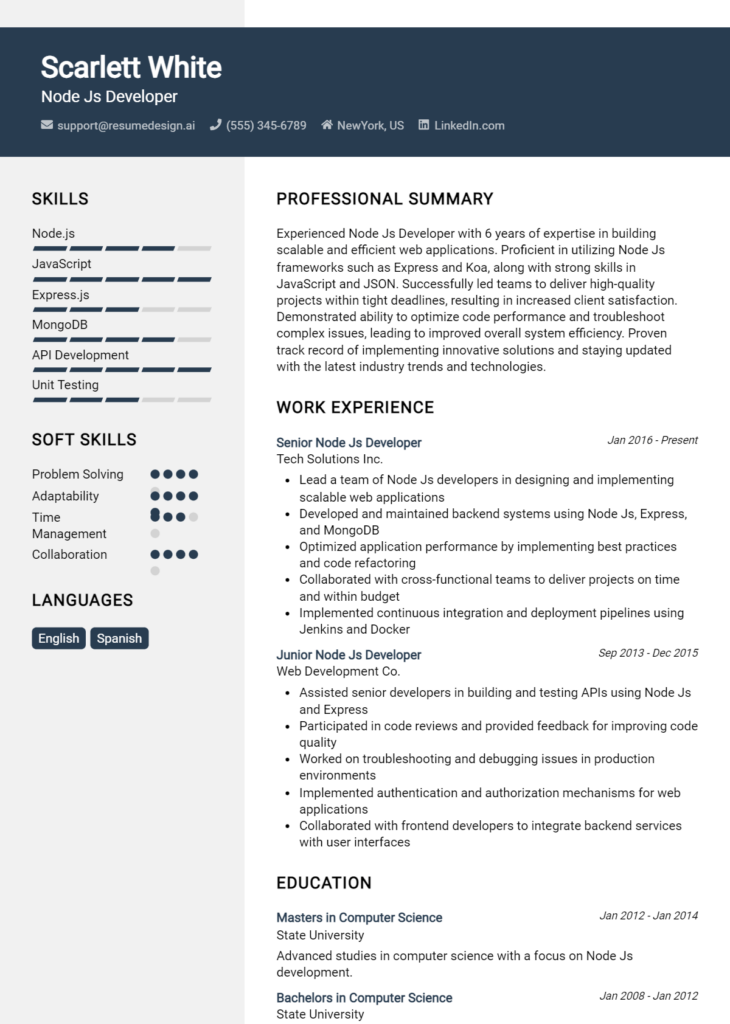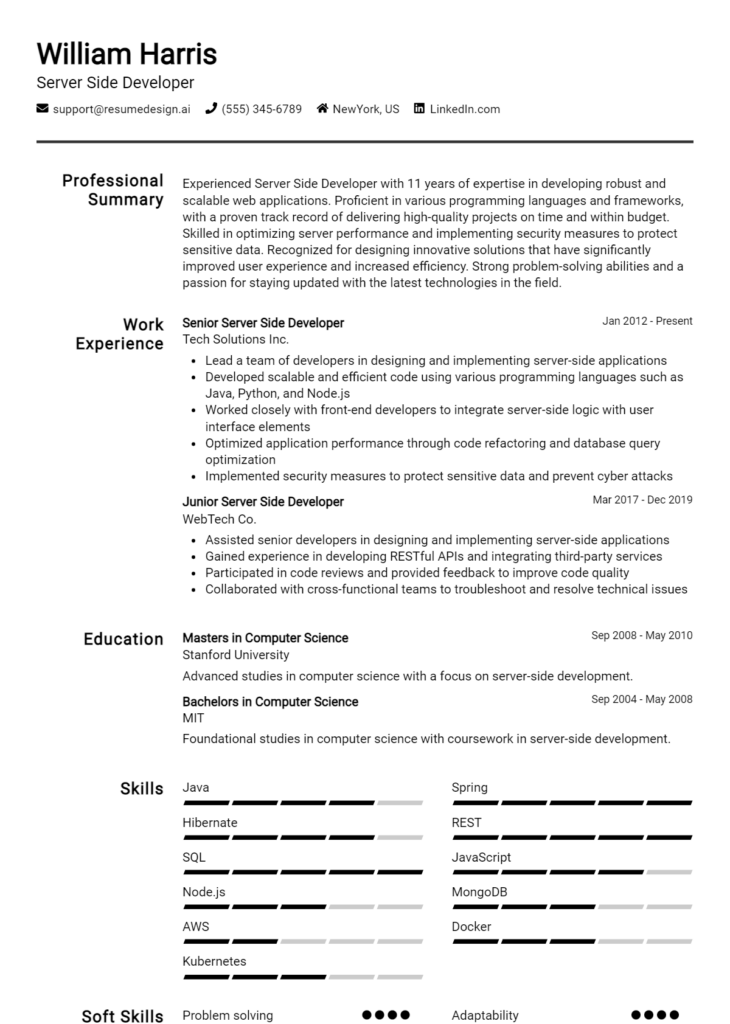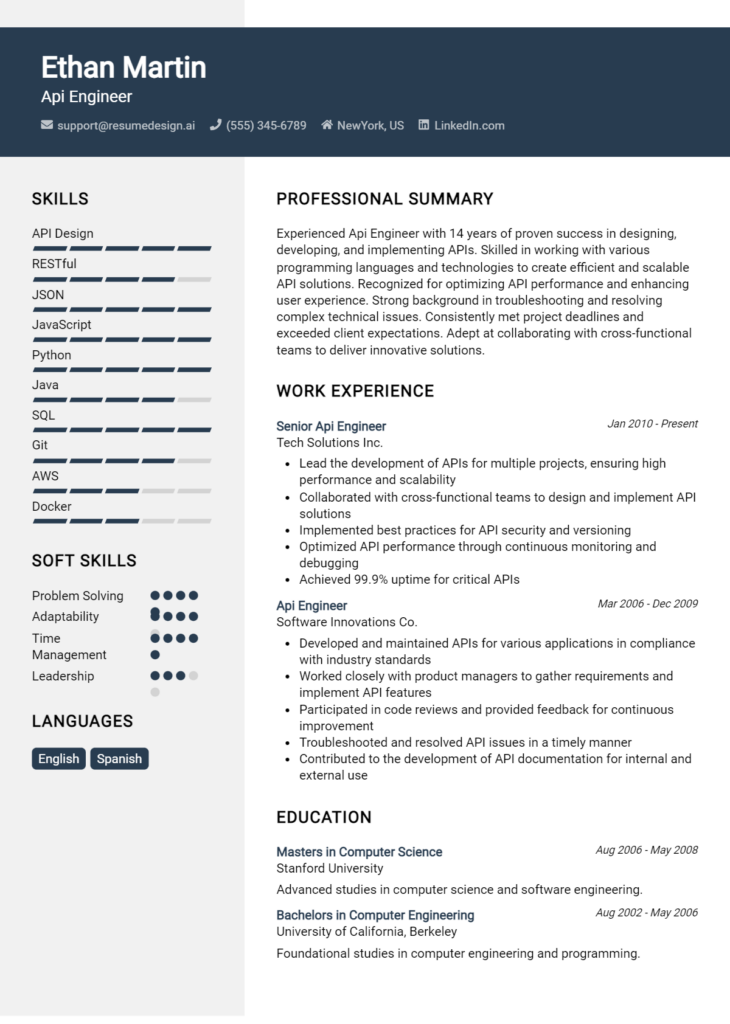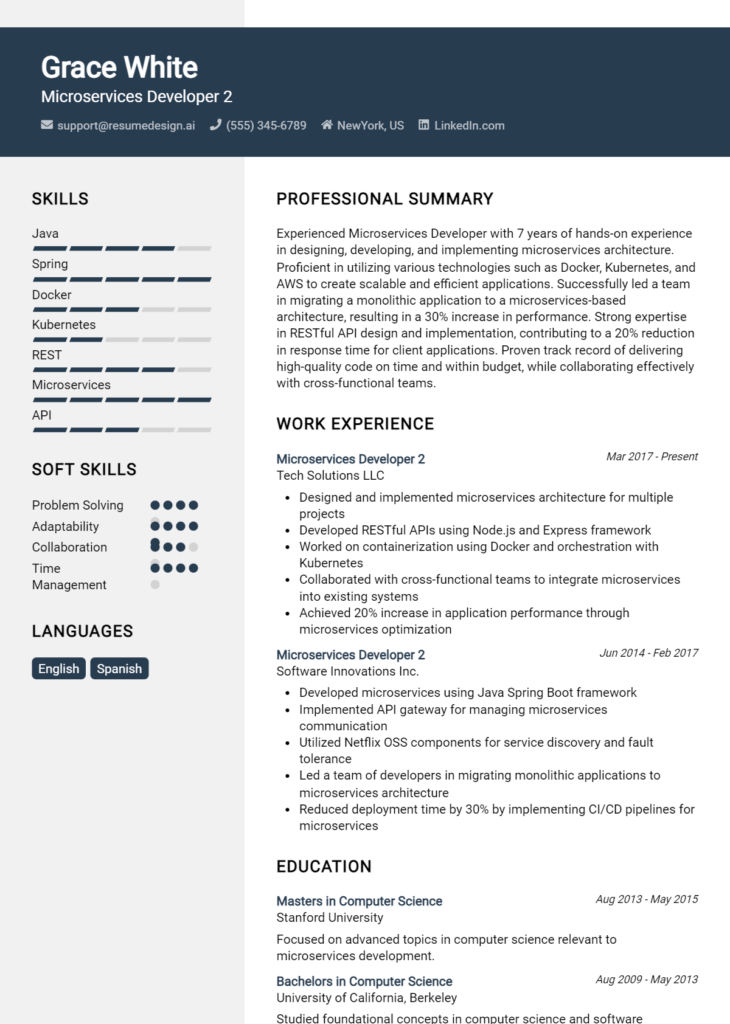Cloud Back-End Developer Core Responsibilities
A Cloud Back-End Developer plays a vital role in creating scalable, secure, and efficient cloud-based applications. Key responsibilities include designing APIs, managing databases, and ensuring seamless integration with front-end services. This professional must possess strong technical skills in programming languages and cloud technologies, along with operational knowledge and problem-solving abilities. By effectively bridging departments such as IT, DevOps, and project management, they contribute significantly to the organization’s goals. A well-structured resume showcasing these qualifications is crucial for career advancement.
Common Responsibilities Listed on Cloud Back-End Developer Resume
- Designing and implementing RESTful APIs for cloud applications.
- Managing and optimizing cloud-based databases and storage solutions.
- Collaborating with front-end developers to integrate user-facing elements.
- Ensuring application security and data protection protocols are in place.
- Monitoring and troubleshooting application performance issues.
- Conducting code reviews and providing mentorship to junior developers.
- Implementing CI/CD pipelines for streamlined development processes.
- Participating in agile development methodologies and sprint planning.
- Documenting system architecture and development processes.
- Staying updated on emerging cloud technologies and best practices.
- Collaborating with cross-functional teams to align project goals.
- Developing automated tests to ensure code reliability and quality.
High-Level Resume Tips for Cloud Back-End Developer Professionals
In today's competitive job market, a well-crafted resume is essential for Cloud Back-End Developer professionals aiming to make a strong first impression on potential employers. Your resume serves as the initial touchpoint, showcasing your skills, experience, and accomplishments in a way that captivates hiring managers. It is crucial that your resume not only reflects your technical prowess but also highlights your achievements in previous roles. This guide will provide practical and actionable resume tips specifically tailored for Cloud Back-End Developer professionals, ensuring you stand out in a crowded field.
Top Resume Tips for Cloud Back-End Developer Professionals
- Tailor your resume for each job application by aligning your skills and experiences with the specific job description.
- Showcase relevant experience by focusing on projects that demonstrate your expertise in cloud technologies and back-end development.
- Quantify your achievements; use metrics and specific outcomes to illustrate the impact of your contributions in previous roles.
- Highlight industry-specific skills such as proficiency in cloud platforms (AWS, Azure, Google Cloud) and programming languages (Java, Python, Node.js).
- Include keywords from the job listing to help your resume pass through applicant tracking systems (ATS).
- Utilize a clean, professional format that makes your resume easy to read and visually appealing.
- Incorporate a summary statement that succinctly outlines your core competencies and career objectives.
- Show continuous learning by mentioning relevant certifications, courses, or workshops related to cloud technologies.
- Provide links to your GitHub or portfolio to give employers insight into your coding style and project contributions.
- Keep your resume concise, ideally one page, ensuring that every word adds value and relevance to your application.
By implementing these tips, you can significantly enhance your resume and increase your chances of landing a job in the Cloud Back-End Developer field. A targeted, well-structured resume not only highlights your qualifications but also demonstrates your commitment to your career, making you a more attractive candidate to potential employers.
Why Resume Headlines & Titles are Important for Cloud Back-End Developer
In the competitive landscape of technology, particularly in cloud computing, a Cloud Back-End Developer's resume must stand out right from the start. Resume headlines and titles play a crucial role in capturing the attention of hiring managers by summarizing a candidate's key qualifications in a succinct and impactful manner. A strong headline can act as a powerful hook, enticing recruiters to delve deeper into the resume. It should be concise, relevant, and directly tied to the job being applied for, effectively communicating the candidate's unique strengths and expertise in back-end development within cloud environments.
Best Practices for Crafting Resume Headlines for Cloud Back-End Developer
- Keep it concise—aim for one impactful phrase.
- Make it relevant to the specific job description.
- Highlight key skills or technologies related to cloud back-end development.
- Use action-oriented language that conveys expertise.
- Avoid jargon or overly technical terms that may confuse the reader.
- Include quantifiable achievements when possible.
- Tailor the headline for each application to reflect the specific role.
- Use keywords from the job listing to align with employer expectations.
Example Resume Headlines for Cloud Back-End Developer
Strong Resume Headlines
"Experienced Cloud Back-End Developer Specializing in AWS and Microservices"
“Full-Stack Developer with 5+ Years in Cloud Solutions and API Integration”
“Proven Expertise in Scalable Cloud Architecture and Database Management”
Weak Resume Headlines
“Developer with Experience”
“Cloud Back-End Developer Seeking Opportunities”
The strong headlines are effective because they are specific, highlight relevant skills and experience, and present a clear value proposition to potential employers. In contrast, the weak headlines fail to impress as they are vague and do not convey any substantial information about the candidate's qualifications or unique strengths, making it difficult for hiring managers to see the candidate's fit for the role. A compelling headline should immediately communicate the candidate's expertise and entice the reader to learn more.
Writing an Exceptional Cloud Back-End Developer Resume Summary
A resume summary is a crucial element for Cloud Back-End Developers as it serves as a first impression for hiring managers. A well-crafted summary can quickly capture attention by highlighting key skills, relevant experience, and notable accomplishments tailored to the job role. This concise and impactful introduction not only sets the tone for the rest of the resume but also provides a snapshot of the candidate’s qualifications, making it easier for hiring managers to gauge suitability for the position at a glance.
Best Practices for Writing a Cloud Back-End Developer Resume Summary
- Quantify achievements to demonstrate impact, such as improved system performance or reduced downtime.
- Focus on relevant skills, including programming languages, cloud services, and frameworks pertinent to back-end development.
- Tailor the summary for the specific job description to ensure alignment with the employer's needs.
- Use action verbs to convey a strong and proactive attitude.
- Keep it concise, ideally within 2-4 sentences, to maintain the reader’s attention.
- Incorporate industry-specific keywords to pass through applicant tracking systems (ATS).
- Highlight both technical and soft skills to present a well-rounded profile.
- Showcase continuous learning or certifications relevant to cloud technologies to emphasize adaptability.
Example Cloud Back-End Developer Resume Summaries
Strong Resume Summaries
Dynamic Cloud Back-End Developer with 5+ years of experience in designing scalable applications using AWS and Azure. Successfully reduced API response time by 30%, enhancing user experience and increasing system reliability.
Results-oriented software engineer specialized in cloud infrastructure and microservices architecture. Led a project that migrated legacy systems to cloud solutions, resulting in a 40% reduction in operational costs and a 25% increase in deployment speed.
Proficient in Java, Python, and Node.js with a proven track record of implementing secure back-end systems. Developed a real-time data processing application that handled over 10,000 requests per minute, significantly improving data handling efficiency.
Weak Resume Summaries
Cloud Back-End Developer with experience in various technologies, looking for a new opportunity.
Skilled in back-end development and cloud computing, I have worked on several projects and am eager to contribute to a team.
The strong resume summaries are effective because they include specific achievements, quantify results, and highlight relevant skills that align with the job role. In contrast, the weak summaries lack detail and specificity, making them too generic and failing to demonstrate the candidate's unique value proposition. By incorporating measurable outcomes and tailored content, the strong examples stand out and provide a clear picture of the candidate's capabilities.
Work Experience Section for Cloud Back-End Developer Resume
The work experience section of a Cloud Back-End Developer resume is crucial as it serves as a platform to demonstrate a candidate's technical proficiency, leadership capabilities, and commitment to delivering high-quality software solutions. This section showcases not only the tools and technologies the candidate is adept in but also their ability to manage teams and collaborate effectively on projects. By quantifying achievements and aligning their experiences with industry standards, candidates can effectively illustrate their impact on past projects and their potential value to future employers.
Best Practices for Cloud Back-End Developer Work Experience
- Highlight relevant technical skills and tools used in each role.
- Quantify achievements with metrics, such as performance improvements or cost savings.
- Emphasize collaboration by detailing cross-functional teamwork and leadership experiences.
- Align your experience with industry standards and best practices, such as Agile methodologies.
- Use action verbs to convey accomplishments and responsibilities effectively.
- Tailor your experience to the job description to demonstrate fit for the role.
- Include specific projects that illustrate your problem-solving skills.
- Showcase continuous learning by mentioning certifications or new technologies adopted.
Example Work Experiences for Cloud Back-End Developer
Strong Experiences
- Led a team of 5 developers to design and implement a microservices architecture that reduced deployment time by 40% and improved system scalability.
- Developed a cloud-based API that processed over 1 million requests per day, enhancing user engagement and supporting a 25% increase in customer retention rates.
- Implemented CI/CD pipelines that decreased code integration time by 30%, significantly improving development workflow efficiency.
- Collaborated with product managers and UX designers to launch a new feature that increased user satisfaction scores by 15%, based on user feedback surveys.
Weak Experiences
- Worked on various projects related to cloud technologies.
- Responsible for backend development tasks.
- Participated in team meetings and discussions.
- Assisted in the deployment of applications.
The strong experiences are considered effective because they provide specific, quantifiable outcomes that demonstrate the candidate's impact and capabilities. They highlight leadership, technical skills, and collaboration, making it clear how the candidate contributed to the success of their projects. In contrast, the weak experiences lack detail and measurable results, leaving the reader with a vague understanding of the candidate's contributions and skills, which diminishes their overall appeal.
Education and Certifications Section for Cloud Back-End Developer Resume
The education and certifications section of a Cloud Back-End Developer resume plays a crucial role in demonstrating the candidate's academic background and industry relevance. This section not only showcases the formal education that has equipped the candidate with foundational knowledge but also highlights specialized certifications that reflect their commitment to continuous learning and staying abreast of current technologies. By providing relevant coursework, recognized certifications, and any specialized training, candidates can significantly enhance their credibility and better align themselves with the demands of the job role, ultimately making a stronger impression on potential employers.
Best Practices for Cloud Back-End Developer Education and Certifications
- Focus on relevant degrees, such as Computer Science, Software Engineering, or Information Technology.
- Highlight industry-recognized certifications, like AWS Certified Developer or Google Cloud Professional Cloud Developer.
- Include specific coursework that aligns with cloud technologies, database management, and back-end development.
- Showcase any specialized training or boot camps that enhance practical skills.
- Use clear formatting and concise language to make the section easy to read.
- List certifications in chronological order, starting with the most recent.
- Emphasize ongoing education efforts, such as online courses or workshops, to illustrate a commitment to professional growth.
- Tailor the education and certifications section to match the job description and requirements of the role.
Example Education and Certifications for Cloud Back-End Developer
Strong Examples
- Bachelor of Science in Computer Science, XYZ University, 2022
- AWS Certified Solutions Architect – Associate, 2023
- Google Cloud Professional Cloud Developer Certification, 2023
- Relevant Coursework: Cloud Computing, Database Management Systems, API Development
Weak Examples
- Bachelor of Arts in English Literature, ABC College, 2015
- CompTIA A+ Certification, 2018
- Certificate in Basic Computer Skills, 2016
- High School Diploma, 2010
The strong examples are considered effective because they directly relate to the skills and knowledge required for a Cloud Back-End Developer. They demonstrate relevant degrees, certifications that are highly esteemed in the industry, and coursework that is applicable to the role. Conversely, the weak examples show a lack of alignment with the desired qualifications for the position, featuring outdated or unrelated credentials that do not support the candidate's aspirations in cloud development.
Top Skills & Keywords for Cloud Back-End Developer Resume
As the demand for cloud computing continues to surge, the role of a Cloud Back-End Developer has become increasingly vital in the tech industry. Crafting an effective resume for this position requires a strategic focus on both hard and soft skills. Employers seek candidates who not only possess technical expertise but also exhibit the ability to collaborate, communicate, and solve problems effectively. Highlighting the right skills can set you apart from other candidates and showcase your suitability for the role. A well-rounded resume should reflect a balance of these competencies to demonstrate your capability to contribute to cloud-based projects and drive innovation in back-end development.
Top Hard & Soft Skills for Cloud Back-End Developer
Hard Skills
- Proficiency in programming languages such as Python, Java, and Node.js
- Experience with cloud service providers like AWS, Azure, or Google Cloud Platform
- Knowledge of RESTful API design and development
- Familiarity with containerization technologies such as Docker and Kubernetes
- Understanding of database management systems, including SQL and NoSQL databases
- Skill in using version control systems, particularly Git
- Experience with serverless architecture and microservices
- Proficiency in DevOps practices and CI/CD pipelines
- Knowledge of security best practices in cloud environments
- Familiarity with Agile methodologies and project management tools
Soft Skills
- Strong problem-solving abilities
- Excellent communication and collaboration skills
- Adaptability to changing technologies and environments
- Attention to detail and a commitment to quality
- Ability to work independently and as part of a team
- Strong analytical thinking and troubleshooting skills
- Time management and organizational skills
- Creativity in finding innovative solutions
- Empathy and understanding when working with cross-functional teams
- Willingness to learn and continuously improve skills
For more information on how to effectively showcase your skills and work experience in your resume, consider exploring additional resources and examples tailored specifically for Cloud Back-End Developers.
Stand Out with a Winning Cloud Back-End Developer Cover Letter
I am excited to apply for the Cloud Back-End Developer position at [Company Name], as advertised on [Job Board/Company Website]. With a robust foundation in cloud technologies and back-end development, coupled with my passion for creating scalable and efficient applications, I am confident in my ability to contribute effectively to your team. My experience with cloud platforms such as AWS, Azure, and Google Cloud, along with proficiency in programming languages like Python, Java, and Node.js, has equipped me with the skills necessary to excel in this role.
In my previous position at [Previous Company Name], I successfully led a team in migrating our legacy systems to a cloud-based architecture, resulting in a 30% reduction in operational costs and a notable improvement in system performance. I implemented RESTful APIs and microservices that enhanced the functionality and scalability of our applications. This experience not only honed my technical skills but also taught me the importance of collaboration and communication within a diverse team, ensuring that project goals are met efficiently.
I am particularly drawn to [Company Name] because of its commitment to innovation and excellence in cloud solutions. I admire your recent projects, such as [specific project or initiative], which align with my interest in developing high-performance applications that drive user engagement and satisfaction. I am eager to bring my technical expertise and creative problem-solving abilities to your team and contribute to the continued success of [Company Name].
Thank you for considering my application. I look forward to the opportunity to discuss how my background and skills can benefit your organization. I am enthusiastic about the possibility of collaborating with the talented team at [Company Name] to create next-generation cloud applications that meet the evolving needs of your clients.
Common Mistakes to Avoid in a Cloud Back-End Developer Resume
When crafting a resume for a Cloud Back-End Developer position, it's essential to present a clear and compelling narrative of your skills and experiences. However, many candidates make common mistakes that can detract from their qualifications. These errors can lead to confusion or misrepresentation of your abilities, ultimately impacting your chances of landing an interview. To help you refine your resume and avoid these pitfalls, here are some common mistakes to steer clear of:
Generic Objective Statements: Using a vague objective that doesn't specify your goals or the value you bring can make your resume blend in with the rest. Tailor your objective to reflect your passion for cloud technology and your career aspirations.
Overloading Technical Jargon: While it's important to demonstrate your technical skills, overloading your resume with jargon can alienate HR personnel or recruiters who may not be familiar with every term. Focus on clear and concise descriptions of your skills and experiences.
Lack of Quantifiable Achievements: Failing to include metrics that showcase your accomplishments can weaken your resume. Always aim to quantify your contributions, such as "improved system performance by 30% through optimized cloud infrastructure."
Ignoring Relevant Experience: Overlooking to include freelance projects, internships, or personal projects that demonstrate your cloud development skills can be a missed opportunity. Ensure all relevant experiences are included, even if they were not formal employment.
Neglecting Soft Skills: Cloud Back-End Development often requires teamwork and communication. Ignoring soft skills like problem-solving and collaboration can give an incomplete picture of your capabilities. Highlight these skills alongside your technical expertise.
Inconsistent Formatting: A resume with inconsistent formatting can be distracting and may give the impression of carelessness. Maintain uniform font styles, sizes, and spacing throughout your document for a professional appearance.
Failing to Tailor for the Job: Sending out the same resume for multiple applications can be ineffective. Customize your resume for each job by aligning your experience and skills with the specific requirements of the position you're targeting.
Omitting Continuous Learning: The tech field, especially cloud computing, evolves rapidly. Not mentioning certifications, courses, or workshops you’ve attended can suggest a lack of initiative. Always include ongoing education to demonstrate your commitment to staying current in the field.
Conclusion
As a Cloud Back-End Developer, it is essential to stay updated on the latest technologies and practices in cloud computing, API development, and database management. This article highlighted the critical skills required for the role, including proficiency in programming languages like Python, Java, or Node.js, as well as experience with cloud platforms such as AWS, Azure, or Google Cloud. Furthermore, understanding microservices architecture, containerization with Docker, and orchestration with Kubernetes is increasingly important for optimizing application performance and scalability.
To effectively showcase these competencies, your resume must clearly reflect your technical expertise, project experience, and problem-solving abilities. Highlight specific projects or contributions that demonstrate your impact on previous employers or projects, as quantifiable achievements can set you apart from other candidates.
Now is the perfect time to review and enhance your Cloud Back-End Developer resume. Utilize available resources to ensure your resume stands out to potential employers. Consider exploring resume templates that can provide a professional layout, or try out the resume builder to create a customized version tailored to your skills. Additionally, reviewing resume examples can give you insights into how to present your experience effectively. Don’t forget to pair your resume with a compelling cover letter using our cover letter templates to make a strong impression.
Take action today—revamp your resume and present yourself as the ideal candidate for Cloud Back-End Developer positions!

